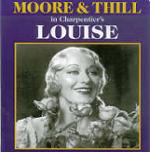This 86-minute, black-and-white, 1938 film of Gustave Charpentier’s opera Louise is of interest for several reasons. First, film buffs will revel in Abel Gance’s direction. Best known during the silent era (his Napoleon is an acknowledged masterpiece), Gance’s way with shadow and light, his control of crowd scenes, the flow of his narrative, and the way in which he melds silent-movie (or “operatic”) gestures with more modern and realistic movement are fascinating to watch. In addition, although there is only about 50 minutes of Charpentier’s music here (there’s much spoken dialogue–all of it, by the way, in un-subtitled French), the composer himself authorized the cuts, and so the story remains intact and the “sense” of Charpentier’s opera remains. But mostly, it is the distinguished performances that carry the day.
The lovely Grace Moore is, well, lovely. In addition to being pretty and graceful, she uses her voice well and inhabits the character. Better yet is Georges Thill, arguably the finest French tenor of the last century. His voice is both heroic and lyrical, his French (of course) impeccable, his ardor genuine. He’s a bit stiff as an actor, but he hasn’t much to do other than sing and be one-dimensionally passionate. And best of all is the much less familiar André Pernet, a bass who sings Louise’s father (the mother is reduced to a speaking role). His grand basse cantante is both smooth and powerful, and while the head-on close-ups of him are effective in depicting his rage, there’s something decidedly operatically overdone about it all.
There’s a good sized chorus and some smaller roles that are well taken–so good, in fact, that it’s a pity there’s not more music. We get only about five minutes of the 35-minute love duet, and the two leads would have been glorious in the whole thing. Of course this is for specialists and those interested in either the singers or this type of stylized cinema, but it’s thoroughly enjoyable. There are no subtitles, but a track-by-track (approximate) synopsis is in the accompanying booklet, and the sound is as good as we could expect.
































